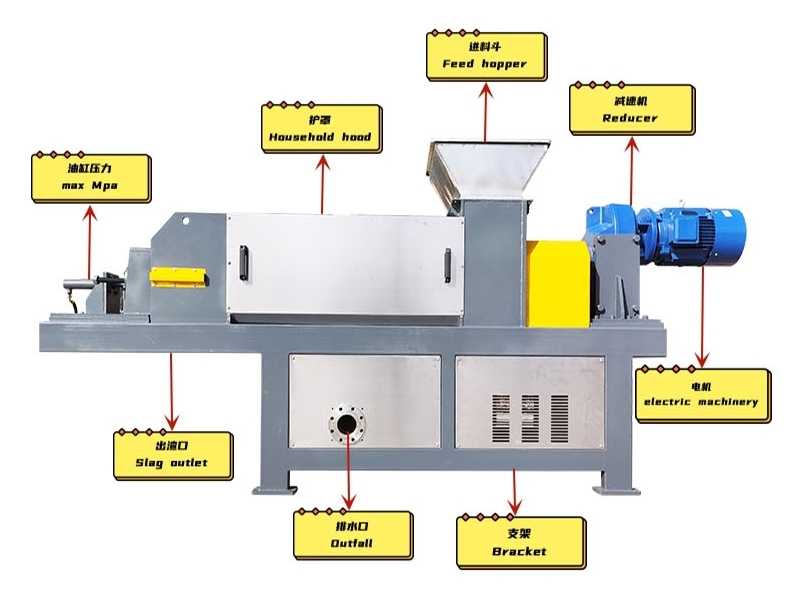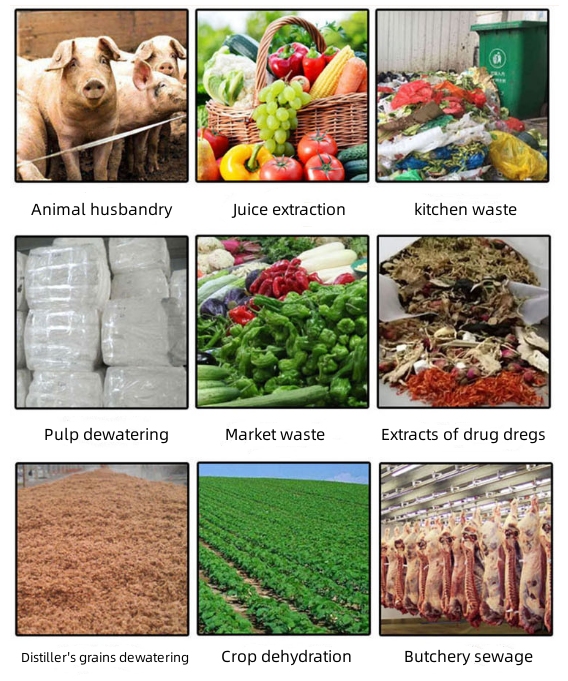
Our company develops and produces a spiral press machine, which is a device that uses physical squeezing to dehydrate materials. The equipment consists of a motor drive system, a feed box, a spiral auger, a sieve screen, a backpressure blocking device, a water collection tank, a frame, and other parts. The material enters the equipment from the feed box and is gradually squeezed under increasing pressure from the spiral auger. Excess water is discharged from the liquid outlet through the sieve screen, while the dehydrated material is pushed out of the equipment through the discharge port by the continued transportation of the spiral auger, aided by the backpressure blocking device.
Our company's spiral press machine has been meticulously designed and tested through hundreds of precise theoretical calculations and experiments, and we have collected feedback from numerous users over many years of use. As a result, we have developed a series of mature and stable equipment that can accurately analyze different materials for dehydration and use different technical parameters to achieve low energy consumption, high output, and low moisture content, thus saving processing costs for materials and enabling their reuse.
Low operating costs and wide application range: The spiral press machine uses the principle of physical squeezing to dehydrate materials, eliminating the need for additional heat sources during the dehydration process, resulting in lower operating costs than other equipment. It is suitable for a variety of materials in various industries and can provide trial services.
Continuous operation and high efficiency: The machine can continuously feed materials, and the parameters of the spiral auger have been analyzed through mechanical calculations to increase axial thrust, effectively solving problems such as slipping, bridging, refeeding, and shaft holding that prevent continuous operation. This greatly increases the processing capacity per unit time.
Low moisture content of discharged residue: Due to the diversity of materials to be dehydrated, the data such as moisture content, molecular water ratio, viscosity, fiber content, water absorption, toughness, organic or inorganic matter, etc., are different for each material. Our engineers will conduct scientific analysis and calculate customized technical parameters based on the material provided by each customer to manufacture equipment that meets their requirements.
Wear-resistant and corrosion-resistant: The special parts of the spiral press machine are wrapped in alloy steel to increase wear resistance, while the core components are made of 304 stainless steel, which is resistant to acid, alkali, and corrosion, greatly extending the service life of the equipment.
No need to add chemicals and easy to operate: The dehydration process does not require the addition of flocculants or other auxiliary chemicals, which avoids additional costs and does not affect the secondary use of the material. Suitable filter screens can be selected according to the properties and requirements of the material to be dehydrated. The detachable sieve screen leaves no residue, making it easier to use.
High degree of automation: The machine can achieve unmanned operation, continuous work, overload protection, automatic alarm, and other functions.
Perfect after-sales service: Our company always adheres to honest business practices, takes every customer seriously, and strictly ensures that the equipment ordered is of high standards and quality according to customer and contract requirements. We provide professional technical support, program design, and 24-hour after-sales response to solve any problems for every user.
Trial service: You can send the material to be processed to our company, and our technicians will test the processing effect for you.
Equipment parameters | ||||||||
Model | Power | Power Rating | Gearbox | Filter(mm) | Weight(KG) | Processing Capacity(m³) | Drainage Pipe(mm) | Material |
CTYZ-160 | 380V | 3KW | gear reducer | 0.75 (optional) | 300 | 0.5-1 | 110 | stainless steel/carbon steel |
CTYZ-200 | 380V | 7.5KW | gear reducer | 0.75 (optional) | 650 | 2-5 | 110 | stainless steel/carbon steel |
CTYZ-300 | 380V | 18.5KW | gear reducer | 0.75 (optional) | 1500 | 5-8 | 110 | stainless steel/carbon steel |
CTYZ-400 | 380V | 22KW | planetary gear reducer | 0.75 (optional) | 3500 | 8-15 | 160 | stainless steel/carbon steel |
CTYZ-600 | 380V | 75KW | planetary gear reducer | 0.75 (optional) | 7500 | 18-30 | 160 | stainless steel/carbon steel |
Note: The motor, gearbox, and material can be customized according to user and usage requirements. | ||||||||

Solid-liquid separation of various solid or liquid materials in different industries, as well as pressing and dewatering of waste residues.
Papermaking, Plastics, Chemical Industry Pulp, wood fibers, grass pulp, wood pulp, etc.; dewatering of plastic scraps, plastic films, plastic powders, etc.; material dewatering in chemical industry.
Biopharmaceuticals, Bio-extraction Dewatering of various plant-based Chinese medicine residues, biological juice extraction, etc.
Fruit and vegetable juice extraction Juicing of vegetables such as cabbage, kale, lettuce, celery, ginger, and tomatoes; fruits such as apples, pears, watermelons, grapes, pineapples, kiwis, mulberries, blueberries, seabuckthorn, oranges, goji berries, etc.; juicing of sweetener herbs such as stevia, chrysanthemum, peony, rose, etc.
Food Processing Oil residue from food factories, tea residue, vinegar residue, seafood waste, beet residue, coconut husk, coffee extraction waste, bran aldehyde residue, fish slurry, shrimp shell waste, chicken skin, chicken feathers, and chicken meat residue.
Energy, Waste Materials Residue from energy-related industries, biogas residue, water grass, cassava residue, sweet potato residue, sugarcane residue, seaweed, gutter oil residue, crop residue, distiller's grains, etc.
Garbage Disposal Food waste, kitchen waste, fruit and vegetable residue from markets, and some household waste, etc.
Livestock Industry Cow manure, pig manure, chicken manure, duck manure, rabbit manure, etc., as well as solid-liquid separation of slaughterhouse wastewater.
Sewage Treatment Residues from sewage treatment industry, grid materials, etc.
Other materials include filter residue, diaper waste, cellulose, medical waste, polymer, animal carcasses, animal skin dewatering, sawdust dewatering, activated carbon, straw residue, etc.




If your company wants to establish a business relationship with us, please briefly describe the cooperation intention and send an email to:chuantaiscrewpress@gmail.com